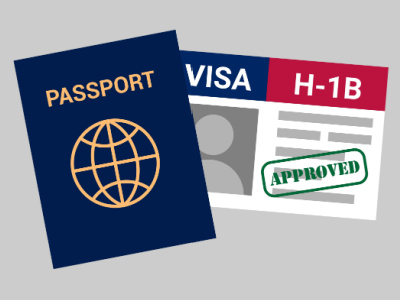It’s that time again. The H-1B visa season has arrived, and employers that are considering petitioning for H-1B visas should start planning for the registration process now. Here’s some general information about H-1B visas, the process, and changes from last year.
H-1B Visas in Demand
When recruiting or hiring candidates for “specialty occupation positions” employers may consider foreign nationals. Positions are specialized if they involve:
- Theoretical and practical application of a body of highly specialized knowledge; and
- Attainment of a bachelor’s or higher degree in the specific specialty (or its equivalent) as a minimum for entry into the occupation in the United States.
Common examples of specialty positions include professional-level workers in finance, health care, science, and technology. The process for hiring a foreign national candidate into this type of position would require an employer to participate in the H-1B visa program, which is tremendously popular.
According to U.S. Citizenship and Immigration Services (USCIS), for fiscal year (FY) 2022, it received 308,613 H-1B registrations and initially selected 87,500 registrations. It conducted a second selection in July 2021 of an additional 27,717 registrations because some of the initial lottery winners didn’t file applications, and then a third selection in November 2021 of an additional 16,753 registrations.
This resulted in a total of 131,970 selected registrations for FY 2022. For FY 2023, USCIS received 483,927 H-1B registrations and initially selected 127,600 registrations. If an employer’s registration isn’t selected, they can’t submit an H-1B Visa application. With such high demand comes challenges for employers.
Planning Needs to Start Early
Although candidates who obtain H-1B visas aren’t eligible to work until the fiscal year starts on October 1, planning begins many months before. For employers that are planning to sponsor foreign nationals for an H-1B visa, it’s critical to start planning now.
You must pay close attention to the deadlines established by USCIS because they come fast. The first step is to create an online account with USCIS. This will allow you to be ready for the big launch at noon EST on March 1, when the initial registration window opens. It will close at noon on March 18. This is a mandatory step in the process, so failure to register will prevent you from seeking an H-1B Visa until the following fiscal year.
After registration is completed within that window, USCIS conducts a lottery to determine which employers will be allowed to file for H-1B Visas. If the employer isn’t chosen, they will remain in the lottery and if it’s reopened at a later time, USCIS can pull additional employer registrations to give them an opportunity later in the fiscal year.
If the employer’s registration is chosen in the lottery, they have 90 days to file the application for the visa. This short time frame is why it is critical to start working early in the process on the application and assembly of necessary materials. If USCIS approves the employer’s application, then the candidate will be eligible to begin employment on October 1.
Increased Fees Proposed
Although the process of registration and lottery remain the same from previous years, USCIS recently proposed a rule that will impact future applications. Specifically, for H-1B visas, they are considering increasing the registration fee from $10 to $215 and the filing fee from $460 to $780. The proposed rule is still taking public comments, though March 6, 2023.
After considering the input, USCIS will craft a final rule and advise of its implementation date. Given that the public comment period coincides with the registration window for H-1B visas, as well as the likely turnaround time for a final rule, it isn’t likely these increased fees would affect the registrations and applications for FY 2024, but it’s very likely there will be a fee increase for FY 2025.
Takeaways
The tight time frames and the demands of detailed applications mean employers need to be proactive in planning for hiring a candidate under an H-1B visa. Employers who are seeking to sponsor a foreign national under this program should be reviewing the USCIS requirements and preparing to register on March 1.
Maureen E. James is an attorney at the firm of Skoler, Abbott & Presser, P.C., in Springfield, Massachusetts, and can be reached at mjames@skoler-abbott.com.

